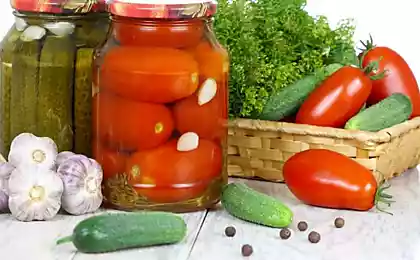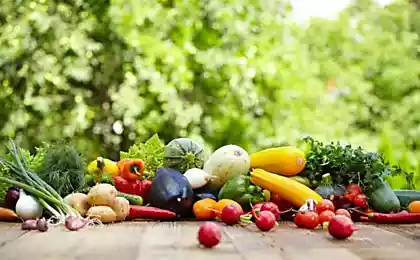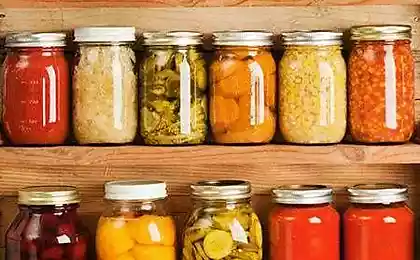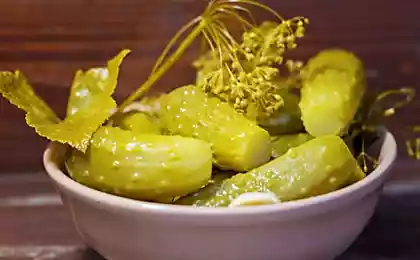148
I'm showing my Austrian friend Daniel a homemade canned food and watching him change his face.
Probably, most people from the USSR are familiar with such a thing as home preservation. Jam, compotes, canned meat and vegetables, lovingly laid in a cool basement and waiting for their time. But what is it? conservationism as such? Why don't you just go to the supermarket and buy what you want right now?

It would probably be a good idea first to treat a foreigner to his favorite twists and listen to what he has to say. So to speak, for the polarity of opinion. And there you can already sum up some results. And you know what? We have just one such foreigner. Well, let's get his thoughts on that.
How to pickle cucumbers, marinate tomatoes or make sea buckthorn compote, knows almost every woman in the country. It's delicious and healthy. In addition, in winter, vitamins are especially needed, and vegetables have a lot of fiber, which will not allow you to eat your sides during the coldest period of the year. So there's a lot of pluses.
One of our friends from Austria had the pleasure of trying some of the popularly beloved “can dishes”. On the menu was a compote of cherry, chicken stew, pickles and tomatoes, as well as ajika and jam. Of course, there were other dishes, no one forbids to combine twists with ordinary food.
The taste, and what would you think? Daniel cracked everything with great pleasure and round eyes. I liked almost everything except Ajika, which he thought was too sharp. The most interesting was his reaction to the way these dishes were prepared.
Now it became clear to everyone: conservation is very useful. Not only do we like canned dishes, we have long been used to them. But the overseas taste echoes that. So we're doing the right thing.
But then our conversation touched, in fact, the price of all these paddies and drinks, and Daniel, raising his eyebrow, began to voice the minuses, which, as he believes, became immediately visible.
First of all, he didn't understand why conservation was worth it. little money. In the sense that a huge amount of glassware (cans) that we use in his country would cost decent money. Not to mention clean water and sugar.

Then the very jam that the foreigner loved so much was criticized: after all, you could just freeze the berries and use them whenever you want. The amount of sugar added to the currants shocked the foreigner.
Then He asked if he could. buy from what he ate in a local supermarket. After receiving an affirmative answer, Daniel asked why not. He missed our monologue about the difference between “his own, natural” twists and “soulless shops”. Says, yes, natural products are also more expensive, but no one has time for gardening. Everyone is trying to live without too much fuss.

At the end of the day, a friend of mine asked how much time and effort had been put into these spins and how much space they had occupied in our apartment. Here we complained that this is a common hobby that brings results, and the basement is in almost every apartment. To which he replied that he was jealous in some way.
This is how the cultural and gastronomic exchange between the two countries took place. What we found out is that the taste is really good, it is not discussed. Excessive labor and resources are thought-provoking, but overall, we haven’t seen anything depressing. How to treat conservation as a hobby or as a compulsory annual work is up to you. That's probably the point of conservation.

That's what we got. Perhaps you have something to say, dear reader: what did our guest not take into account or what could we convey to him? We'll definitely give it to you, because it's "Site".

It would probably be a good idea first to treat a foreigner to his favorite twists and listen to what he has to say. So to speak, for the polarity of opinion. And there you can already sum up some results. And you know what? We have just one such foreigner. Well, let's get his thoughts on that.
How to pickle cucumbers, marinate tomatoes or make sea buckthorn compote, knows almost every woman in the country. It's delicious and healthy. In addition, in winter, vitamins are especially needed, and vegetables have a lot of fiber, which will not allow you to eat your sides during the coldest period of the year. So there's a lot of pluses.
One of our friends from Austria had the pleasure of trying some of the popularly beloved “can dishes”. On the menu was a compote of cherry, chicken stew, pickles and tomatoes, as well as ajika and jam. Of course, there were other dishes, no one forbids to combine twists with ordinary food.
The taste, and what would you think? Daniel cracked everything with great pleasure and round eyes. I liked almost everything except Ajika, which he thought was too sharp. The most interesting was his reaction to the way these dishes were prepared.
- Compote. A very natural and refreshing drink. It’s amazing how much patience and time was spent creating it. After all, it is not even juice, but just water, some berries and sugar.
- Chicken stew It didn’t cause such a violent reaction, because Daniel had already tried something similar at home. Only it is unclear where and under what circumstances, because at home he almost does not cook, and prefers to go to cafes or dining rooms. Apparently, there he was served some kind of stew.
- Pickles and tomatoes - just divine. Very good snack for any dish. It refreshes the taste and cools, for example, hot mashed potatoes.

- AjikaLike I said, I didn’t like it because of its taste. It doesn't fit or fit. For every taste there is a eater.
- Currant jamIt's just our opinion, not the most delicious jam that can be. There is also raspberry, strawberry, plum, even nutty. But Daniel was just in love with him. He said he would have sold it at home with great success. And we tend to believe that.
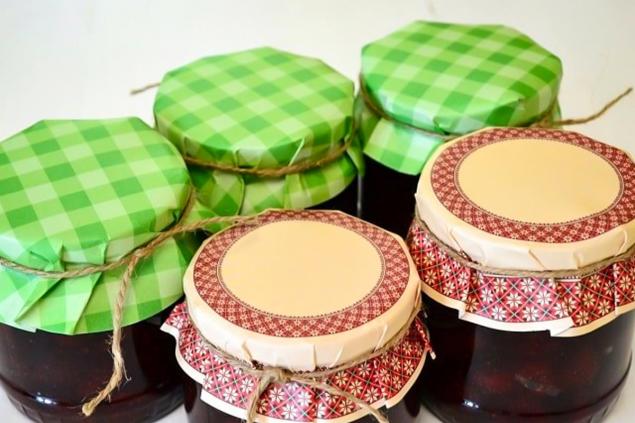
Now it became clear to everyone: conservation is very useful. Not only do we like canned dishes, we have long been used to them. But the overseas taste echoes that. So we're doing the right thing.
But then our conversation touched, in fact, the price of all these paddies and drinks, and Daniel, raising his eyebrow, began to voice the minuses, which, as he believes, became immediately visible.
First of all, he didn't understand why conservation was worth it. little money. In the sense that a huge amount of glassware (cans) that we use in his country would cost decent money. Not to mention clean water and sugar.

Then the very jam that the foreigner loved so much was criticized: after all, you could just freeze the berries and use them whenever you want. The amount of sugar added to the currants shocked the foreigner.
Then He asked if he could. buy from what he ate in a local supermarket. After receiving an affirmative answer, Daniel asked why not. He missed our monologue about the difference between “his own, natural” twists and “soulless shops”. Says, yes, natural products are also more expensive, but no one has time for gardening. Everyone is trying to live without too much fuss.

At the end of the day, a friend of mine asked how much time and effort had been put into these spins and how much space they had occupied in our apartment. Here we complained that this is a common hobby that brings results, and the basement is in almost every apartment. To which he replied that he was jealous in some way.
This is how the cultural and gastronomic exchange between the two countries took place. What we found out is that the taste is really good, it is not discussed. Excessive labor and resources are thought-provoking, but overall, we haven’t seen anything depressing. How to treat conservation as a hobby or as a compulsory annual work is up to you. That's probably the point of conservation.

That's what we got. Perhaps you have something to say, dear reader: what did our guest not take into account or what could we convey to him? We'll definitely give it to you, because it's "Site".
Dessert for daughter who desperately gets back in shape after granddaughter's birth
Women's wardrobe connoisseur reveals how clothes betray a woman's loneliness













